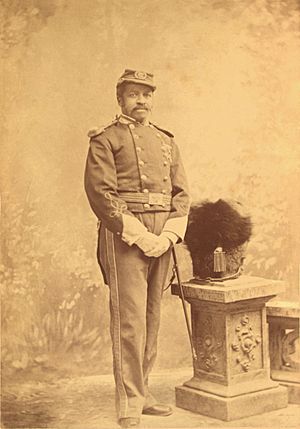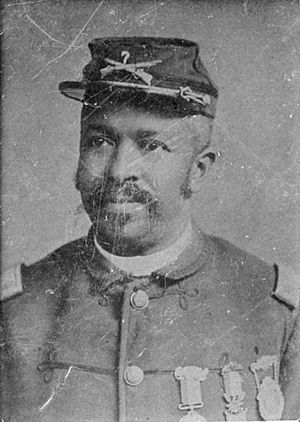Christian Abraham Fleetwood facts for kids
Quick facts for kids
Christian Abraham Fleetwood
|
|
|---|---|

Christian Fleetwood, as Captain of the Washington Cadet Corps (WCC)
|
|
| Born | July 21, 1840 Baltimore, Maryland |
| Died | September 28, 1914 (aged 74) Washington, D.C. |
| Place of burial |
Columbian Harmony Cemetery, Washington, D.C.
|
| Allegiance | United States of America Union |
| Service/ |
U.S. Army (Union Army) Washington Colored National Guard aka Washington Cadet Corps D.C. National Guard |
| Years of service | 1863–1866 1880-1892 |
| Rank |
Sergeant Major (Army) Major (National Guard) |
| Unit | 4th Regiment United States Colored Troops, 6th, later 7th BN D.C. National Guard |
| Commands held | Washington Cadet Corps (6th, later 7th BN, D.C. National Guard) |
| Battles/wars | American Civil War |
| Awards | Medal of Honor Butler Medal |
| Other work | editor, musician, and politician |
Christian Abraham Fleetwood (born July 21, 1840 – died September 28, 1914) was an African American soldier and leader. He served in the United States Army and later in the D.C. National Guard. Fleetwood was also a writer, a musician, and worked for the government. He is famous for receiving the Medal of Honor for his brave actions during the American Civil War.
Contents
Early Life and Education
Christian Fleetwood was born in Baltimore, Maryland, on July 21, 1840. His parents, Charles and Anna Maria Fleetwood, were both free people of color. This meant they were not enslaved.
Christian received his first lessons at home from the wife of a wealthy businessman named John C. Brunes. She treated him like her own son and taught him to read and write. He continued his studies at the Maryland State Colonization Society. He also briefly visited Liberia and Sierra Leone in Africa.
In 1860, he graduated from Ashmun Institute, which is now known as Lincoln University. After college, he started and published a newspaper called The Lyceum Observer. It was one of the first newspapers in the southern United States owned and run by an African American.
Serving in the Civil War
When the American Civil War began, Christian Fleetwood joined the Union Army. On August 11, 1863, he enlisted in Company G of the 4th Regiment United States Colored Infantry. Because he was well-educated, Fleetwood was made a sergeant right away. Just two days later, he was promoted to sergeant major.
His regiment fought in many important battles in North Carolina and Virginia. These included the Battle of Petersburg and the Battle of Chaffin's Farm.
Bravery at Chaffin's Farm
On September 29, 1864, Fleetwood's regiment fought in the Battle of Chaffin's Farm. This battle took place near Richmond, Virginia, the capital of the Confederate army.
During the battle, Fleetwood's unit charged at the enemy's defenses. Sergeant Alfred B. Hilton was carrying two flags, but he was wounded. Fleetwood and another soldier, Charles Veale, quickly grabbed the flags before they could fall to the ground. Fleetwood took the American flag and kept moving forward, even under heavy enemy fire.
When it became clear that his unit could not break through the enemy lines, Fleetwood retreated. He used the flag to gather a small group of soldiers and keep fighting. For their amazing bravery, Fleetwood, Hilton, and Veale each received the Medal of Honor on April 6, 1865.
Fleetwood's Medal of Honor award simply says: "Seized the colors, after 2 color bearers had been shot down, and bore them nobly through the fight." His medal is now kept at the National Museum of American History in the Smithsonian. He also won a Butler Medal for his actions in the same battle.
Even though many officers wanted Fleetwood to become an officer, he was not chosen. He was honorably discharged from the Army on May 4, 1866. Fleetwood kept a diary in 1864, which describes his experiences during the war.
Life After the War
After the war, Fleetwood worked as a bookkeeper in Columbus, Ohio. Later, he held several government jobs in Washington, D.C.. On November 16, 1869, he married Sara Iredell. Sara's grandmother was the sister of John Pierre Burr, a famous abolitionist. John Pierre Burr was also the son of U.S. vice president, Aaron Burr.
Christian and Sara Fleetwood had one daughter, Edith. They were friends with many important African American leaders of their time. These leaders often visited their home in Washington.
Leading the Washington Cadets
In January 1881, Fleetwood was chosen to be Captain of the Washington Colored National Guard, also known as the Washington Cadets. This group was made up entirely of Black soldiers. Fleetwood helped the Cadets grow from one company to a battalion with four companies.
In 1887, the Washington Cadets became the 6th Battalion of the District of Columbia Army National Guard (DCNG). Fleetwood organized this battalion and became its commanding officer with the rank of major. He resigned from the National Guard in 1892.
Fleetwood also helped create the Colored High School Cadet Corps in Washington, D.C., in 1888. This group, also called the Washington High School Cadets, helped train young Black men in military skills. Fleetwood was the first instructor for this corps until 1897. His work helped inspire many young Black men to serve in the military, including during World War I.
Later Years and Health
Fleetwood never returned to active military duty. He applied for a pension in 1891 because he had severe hearing loss. He was completely deaf in his left ear and mostly deaf in his right ear. These problems were caused by his time in the army. His hearing loss eventually prevented him from speaking or singing in public.
Before his hearing got worse, Fleetwood was a choirmaster for several churches. He led musical performances that were very popular. Even the wives of former presidents, like Lucy Webb Hayes and Frances Folsom Cleveland, supported his music.
Death and Legacy
Christian Fleetwood passed away suddenly from heart failure in Washington, D.C., on September 28, 1914. He was 74 years old. His funeral was held at St. Luke's Episcopal Church.
He was buried in Columbian Harmony Cemetery in Washington, D.C. The First Separate Battalion of the D.C. National Guard served as an escort at his funeral. Many important people from Washington attended. In 1959, his remains were moved to National Harmony Memorial Park when Columbian Harmony Cemetery closed.
Christian Fleetwood is remembered as a brave soldier, a dedicated leader, and an important figure in the African American community.
 | Bessie Coleman |
 | Spann Watson |
 | Jill E. Brown |
 | Sherman W. White |


